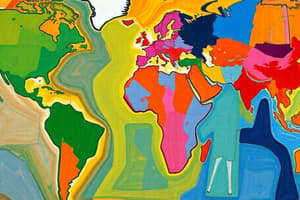Podcast
Questions and Answers
List the reasons that nations trade with one another.
List the reasons that nations trade with one another.
Nations trade because they believe the products they receive are worth more than what they give up. Specialization allows them to produce the best products to trade.
How do specialization and trade benefit both trading partners?
How do specialization and trade benefit both trading partners?
Countries specialize in producing goods they can make efficiently and trade for goods they cannot produce as well, benefiting both partners.
Why does total world output increase as countries specialize to engage in trade?
Why does total world output increase as countries specialize to engage in trade?
Total world output increases because specialization allows countries to produce more efficiently, leading to greater overall production.
What does the theory of comparative advantage suggest that countries should do?
What does the theory of comparative advantage suggest that countries should do?
How do comparative advantage and absolute advantage differ? Use examples to support your comparison.
How do comparative advantage and absolute advantage differ? Use examples to support your comparison.
Suppose a nation has a great deal of human capital but few natural resources. In what kinds of products might the nation specialize?
Suppose a nation has a great deal of human capital but few natural resources. In what kinds of products might the nation specialize?
What would happen if the United States lost its comparative advantage in producing soybeans?
What would happen if the United States lost its comparative advantage in producing soybeans?
Compare the price of a pair of $100 tennis shoes in the United States with the same brand sold in South Korea and France.
Compare the price of a pair of $100 tennis shoes in the United States with the same brand sold in South Korea and France.
You are planning to travel to Canada next week and have just learned that the Canadian dollar has weakened. Is this good news or bad news? Explain your answer.
You are planning to travel to Canada next week and have just learned that the Canadian dollar has weakened. Is this good news or bad news? Explain your answer.
How does China censor Internet traffic?
How does China censor Internet traffic?
Why is censorship a form of trade barrier?
Why is censorship a form of trade barrier?
Flashcards are hidden until you start studying
Study Notes
Reasons for International Trade
- Nations trade to obtain products they value more than what they offer.
- Specialization leads to increased efficiency and production quality.
- Even large nations like the United States benefit from international trade, especially in services like banking and insurance.
Specialization and Trade Benefits
- A country's exports reflect its specialization; imports indicate goods not produced efficiently.
- Different regions also specialize, e.g., New York in finance, Michigan in automobiles, and Texas in oil.
- Specialization allows countries to produce goods effectively and trade for needed products.
Increase in World Output through Specialization
- Specialization and trade boost overall world production, illustrated by Alpha and Beta's trade improving total output from 30 to 46 units.
- Comparative advantages drive trading decisions; countries trade for products they cannot produce as efficiently.
Comparative Advantage Theory
- Theory suggests countries should focus on areas of efficient production and trade for less efficiently produced goods.
- Emphasizes the benefit of countries using their resources in optimal ways.
Comparative vs. Absolute Advantage
- Absolute advantage: producing a good with fewer inputs (e.g., one country producing computers cheaper than another).
- Comparative advantage: producing at a lower opportunity cost (e.g., a nation reforming its production to focus on goods with lesser trade-offs).
Specialization without Natural Resources
- Nations rich in human capital but poor in resources may specialize in technology-dependent sectors like electronics.
- Such countries can import raw materials and focus on labor-intensive industries like construction.
Consequences of Losing Comparative Advantage
- Loss of comparative advantage leads to increased opportunity costs in production, forcing countries to shift to importing rather than producing.
- The U.S. would have to forfeit soybean production if it loses efficiency in this area.
Price Comparison for Tennis Shoes
- U.S. priced tennis shoes at $100, which is exorbitantly costly in South Korea (11,000 won) but comparably priced in France (100 euros).
Impact of Currency Weakness for Tourists
- A weaker Canadian dollar is beneficial for U.S. tourists as they receive more Canadian currency for their dollars, enhancing purchasing power abroad.
Internet Censorship in China
- China employs technology and agencies to monitor and control internet content, aiming to eliminate scams and offensive material.
Censorship as a Trade Barrier
- Censorship limits free trade by restricting information flow, impacting international business transactions and relations.
Studying That Suits You
Use AI to generate personalized quizzes and flashcards to suit your learning preferences.




